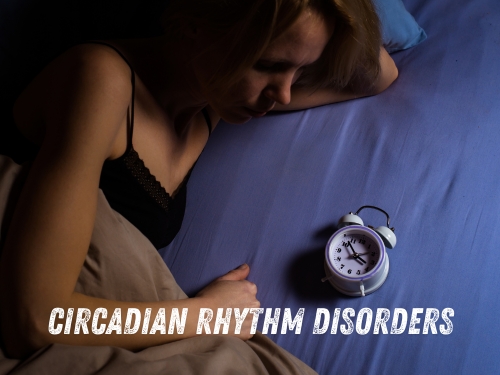What Are Circadian Rhythm Disorders?
Circadian rhythms are the body’s natural internal clock that regulates sleep-wake cycles over a 24-hour period. When these rhythms are disrupted, it can lead to circadian rhythm sleep disorders (CRSDs), affecting sleep quality and overall health.
There are five primary types of circadian rhythm disorders:
- Delayed Sleep Phase Disorder (DSPD) – Difficulty falling asleep and waking up late.
- Advanced Sleep Wake Phase Disorder (ASWPD) – Falling asleep too early in the evening and waking up very early.
- Non-24-Hour Sleep-Wake Disorder (Non-24) – Sleep cycles shift later each day.
- Irregular Sleep-Wake Disorder (ISWD) – Sleep occurs in multiple short periods throughout the day and night.
- Shift Work Disorder – Sleep disruption due to working night shifts or irregular hours.
Types of Circadian Rhythm Disorders
1. Delayed Sleep Phase Disorder (DSPD)
Key Symptoms:
✔️ Trouble falling asleep at a conventional bedtime (10 PM – midnight)
✔️ Difficulty waking up early for work or school
✔️ Feeling more alert in the evening and drowsy in the morning
Who Is Affected?
DSPD is common in adolescents and young adults (7-16% prevalence) and can be mistaken for insomnia, ADHD, or depression. It often leads to poor performance, daytime fatigue, and health risks if untreated.
2. Non-24-Hour Sleep-Wake Disorder (Non-24)
- The sleep cycle gradually shifts later each day, making it impossible to maintain a regular schedule.
- More common in blind individuals, but can also affect sighted people.
3. Advanced Sleep Wake Phase Disorder (ASWPD)
- People fall asleep very early (6-8 PM) and wake up extremely early (2-5 AM).
- It can cause insufficient sleep duration and early morning insomnia.
- More common in older adults and those with a family history.
4. Irregular Sleep-Wake Disorder (ISWD)
- No consistent sleep-wake pattern.
- Sleep occurs in multiple fragmented episodes throughout the day and night.
- Common in people with neurodevelopmental disorders or dementia.
5. Shift Work Disorder
- Caused by working night shifts or irregular work hours.
- Leads to insomnia, excessive sleepiness, and difficulty concentrating.
- Long-term effects include higher risks of heart disease, obesity, and mental health issues.
How to Diagnose Circadian Rhythm Disorders
Common Questions for Diagnosis
- What time do you naturally fall asleep and wake up?
- Do you feel more alert in the evening or morning?
- Do you struggle with excessive daytime sleepiness?
- Is your sleep pattern different on weekends vs. weekdays?
- Do you have a family history of sleep disorders?
Diagnostic Tools
📌 Sleep Diary: Track sleep patterns for at least 2 weeks.
📌 Actigraphy: A wearable device like an Actiwatch monitors sleep-wake cycles.
📌 Sleep Studies: Overnight monitoring if other sleep disorders are suspected.
Best Treatment Strategies for Circadian Rhythm Disorders
1. Light Therapy 💡
✅ For DSPD: Expose yourself to bright light early in the morning to shift your sleep earlier.
✅ For ASWPD: Get bright light exposure in the evening to push bedtime later.
✅ For Shift Work Disorder: Use blue-light therapy before a night shift to stay awake.
✅ Avoid Screens & Bright Light Before Bed: Blue-light-blocking glasses can help prevent sleep disruption.
2. Melatonin Therapy 🌙
- For DSPD: Take low-dose (0.5-1 mg) melatonin about 4-5 hours before bedtime to advance sleep.
- For ASWPD: Avoid early evening melatonin, as it may worsen symptoms.
- Melatonin supplements should be used under medical supervision.
3. Sleep Hygiene & Lifestyle Changes 🛌
✔ Stick to a Consistent Sleep Schedule – Sleep and wake up at the same time daily.
✔ Avoid Caffeine & Heavy Meals Before Bed – These can delay sleep onset.
✔ Exercise in the Morning – Boosts alertness and helps regulate sleep cycles.
✔ Limit Long Weekend Sleep-Ins – They can disrupt your body clock.
When to See a Sleep Specialist?
📍 If you experience chronic sleep difficulties lasting more than 3 months.
📍 If your sleep-wake schedule interferes with work, school, or daily life.
📍 If you suspect a circadian rhythm disorder and self-help strategies aren’t working.
Resources & Support
📌 Sleep Health Foundation: www.sleephealthfoundation.org.au
📌 Sleep Foundation: www.sleepfoundation.org
📌 Australian Sleep Association: www.sleep.org.au
Final Thoughts
Circadian rhythm disorders can significantly impact daily life, but with proper diagnosis and treatment, they can be effectively managed. If you suspect you have a sleep-wake disorder, consult a sleep specialist for personalized treatment.
🛏️ Prioritize good sleep for better health and well-being!
About Us
At RSDC we have a particular interest in quick approach and triaging patients with suspected lung malignancy, management of pleural diseases, sleep disorders of obstructive sleep apnoea and other more complex sleep disorders, airways disease including asthma and COPD.
We use a comprehensive approach to interstitial lung disease in addition to occupational and environmental lung disease.

